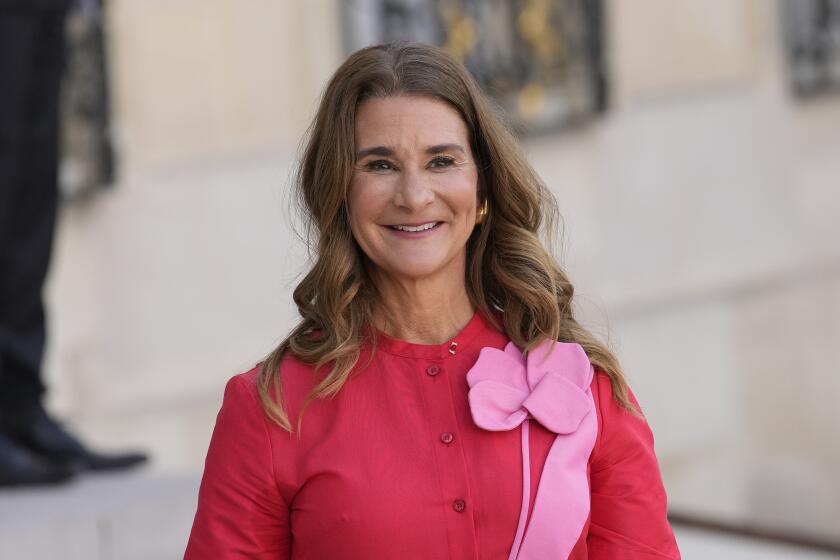Li Calls for Continued Economic Reform, Tight Political Controls : China: The premier’s ‘State of the Union’ speech to Parliament stresses that stability and development are mutually reinforcing.
Premier Li Peng, in the equivalent of a State of the Union address, called Friday for China to persevere in a policy of cautious economic reform and tight political controls.
Li’s speech to the National People’s Congress, China’s rubber-stamp Parliament, endorsed the principle of faster growth but did not fully match the reformist fervor evident in some recent official statements.
“To make China a powerful, socialist country standing firm as a rock in the East, we must concentrate on our domestic affairs--above all, on more rapid economic development,” Li declared.
Li noted that China has planned on 6% economic growth this year, but he said that parts of the country capable of growing more rapidly should aim to do so. The economy expanded by 7% last year, and many observers think China can grow even faster. Li has previously advocated slower growth to maintain economic balance and control inflation.
“We should aim high, work hard, pay attention to economic results and bring about sustained, coordinated growth to raise our economy to a new stage every few years,” Li said. “That is the only way to prevent a peaceful evolution toward capitalism and to consolidate the foundation of the socialist system.”
Li, who is generally viewed as a hard-liner, said that economic growth has helped China’s Communist government “withstand the tests of the difficult situation both at home and abroad.” He stressed that political stability and economic development are mutually reinforcing.
“It is impossible for us to proceed with reform and expand the economy amid social upheaval,” Li declared. “Order leads to prosperity and chaos to decline.”
Li made no mention of an ideological formulation, announced last week by the Communist Party’s policy-setting Politburo, which called for the nation to guard against any excessive “leftism” that undermines market-oriented reforms. Some Chinese and Western analysts have viewed that decision as ultimately aimed, in part, at undercutting Li’s power in favor of more enthusiastic reformers.
Parts of Li’s speech could be viewed as signaling that the premier and his hard-line supporters continue to oppose any weakening of political repression and ideological control.
“We should do two types of work at the same time, attaching equal importance to both,” Li said. “We should promote reform and opening to the outside world and, at the same time, crack down on criminal activity of all kinds.” In China, opposition to the government is officially viewed as a kind of “criminal” behavior, and such “counterrevolutionary” activities apparently were part of what Li had in mind.
“We should work for material progress and, at the same time, for ethical progress,” Li continued. “We should not hesitate to take forceful action against criminal activities and to eliminate social evils; if we are too tender-hearted, we shall come to grief.”
Li presumably had major influence over the contents of his speech, which is officially described as a government work report. But he does not have total authority over what to say. Early drafts must be shown to other leaders, who can suggest revisions. According to reports in the Chinese-language press in Hong Kong, the version delivered Friday had a more reformist tone than earlier drafts.
China’s premier is expected to make a speech every year on the opening day of the annual two-week session of the nearly 3,000-member National People’s Congress. Li’s speech this year--heard by 2,569 delegates who showed up for Friday’s session--was marked by overall blandness and caution. He proposed little in the way of new reforms but endorsed those already under way. He also dropped most of the harsh ideological rhetoric that characterized his speeches of the past two years.
Without offering details, Li mentioned prices, retail merchandising, banking, housing, employment, wages and social insurance as areas in which market-oriented economic reforms should move forward. He endorsed further development of markets for capital funds, technology, information and real estate. He backed further growth of market-oriented rural enterprises and expressed support for science and technology as a key foundation of economic growth. He also called on Chinese studying abroad to return home to aid in modernization “no matter what their political attitudes were in the past.”
But in comments that reflect the government’s ideological confusion and factional infighting, he gave a somewhat incoherent recipe for whipping China’s inefficient state-run enterprises into better shape: “An enterprise must improve its structure of leadership, ensure that the Communist Party organization (within the enterprise) functions as the political core, uphold and improve the system under which the factory director assumes full responsibility, and rely wholeheartedly on the working class.”
The problems of state-run enterprises relate in part to a paralysis of power between party ideologues, technically trained managers and a poorly motivated work force. The speech’s formulation thus comes closer to describing the present stalemate than it does to suggesting a cure.
Li gave approval to what he called “experiments” with share-holding and securities exchanges. He justified them as “an effective way of raising funds for economic development and supervising the management of enterprises.”
Li also said there has been “some improvement” in Sino-U.S. relations over the past year. He said his government believes that “existing obstacles can be removed.”
More to Read
Start your day right
Sign up for Essential California for news, features and recommendations from the L.A. Times and beyond in your inbox six days a week.
You may occasionally receive promotional content from the Los Angeles Times.






